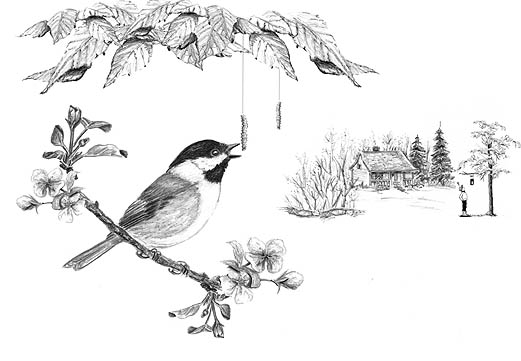
Dear Bird Folks,
I was reading one of your old columns, off your website, in which you explained why many of us don’t have birds in the early part of the winter. You told us that many of the birds have migrated south, that early winter offers an abundance of natural food left over from the fall, the cold weather keeps birds away from exposed feeders, blah, blah, blah. Fine, but it is now June, the birds are back from the south, the weather is warm, yet the birds that I had in May have suddenly disappeared. What’s going on?
-Nick, Bedford, NY
Really Nick,
Did I really write “blah, blah, blah?” I often think about writing that, but I didn’t realize that I actually did it. No wonder you are confused. Blah, blah, blah doesn’t make any sense at all. What I should have written is “yada, yada, yada.” That would have been clearer. Sorry for the confusion.
On a bird watcher’s calendar, June is the least loved month of them all. It is the skip in the record, the blank spot on the tape, the bald spot on the head of…. you get the point. With the return of the warm weather and the return of the birds from the south you would think that June would be a rocking birding month. Well think again. The rocking birding month is May. June is a sleeper.
College basketball has March madness, but that pales to the May madness in the birding world. Wave after wave of migrating birds flow up from the tropics. Our phone is constantly ringing with excited people reporting hummingbirds, orioles, buntings, grosbeaks, kingbirds, flycatchers, and warblers. Some birds will remain in our yards all summer, while others are just passing through, but they all are hungry. The hungry birds come to our feeders or eat in our trees. They aren’t shy, they don’t have time to be shy. They are out there for all to see. Then June arrives and it’s as if someone has thrown a switch. Migration ends, the leaves come on the trees, the birds settle down and everything seems to stop. Well, everything except our phone. Now the callers are asking where did all the birds go?
June is the prime nesting month for most songbirds. Even the resident chickadees and cardinals spend less time at our feeders and more time tending to their baby birds. The next question you might ask is, “With a nest full of baby birds, why wouldn’t the adults be scoffing down more birdseed to give to their young birds?” Most birds, even many seed eating birds, feed their nestlings worms and insects. Young birds grow much faster when they are fed on a protein rich diet of juicy worms. Those little inchworms that make the sissies scream and cause others to spread poison are very important to nesting birds. I don’t know what is going on in Bedford right now, but around here those inchworms are hanging everywhere and the birds are scooping them up and feeding them to their kids.
Even the orioles and hummingbirds, that were so active at feeders in May, have switched to insects. The oranges and grape jelly suddenly have become less attractive to the orioles. They, too, are taking part in the inchworm fest, picking off every worm in sight and taking them to their nest. It is hard to imagine a hummingbird feasting on insects, but they do too. Hummers are on the constant lookout for minute flying insects that they snap up with their tongue to feed themselves or their nestlings.
There are exceptions of course. A few lucky birds, for whatever reason, don’t have families to feed. They are either too young, too old, too dumb or too ugly to find a mate, so they are able to enjoy the summer without all those nagging parental duties. And let’s not forget the goldfinches. Goldfinches don’t nest until later in the summer, so even in June they are visiting our feeders.
The good news is that when the birds do return to the feeders there will be more of them than ever. This reproduction thing really cranks out the baby birds. By midsummer there will be more birds in your neighborhood than any other time of year. The new birds will be fighting over the feeder, you’ll be running out to fill it every few minutes, blah, blah, blah, blah, and everything will be back to normal.
I know you miss your feeder birds, Nick, but you don’t miss them nearly as much as I do. My birdseed sales plummet during nesting season. If I don’t sell lots of birdseed, then I can’t afford to shop for groceries and my kids are getting awfully tired of eating inchworms every night.